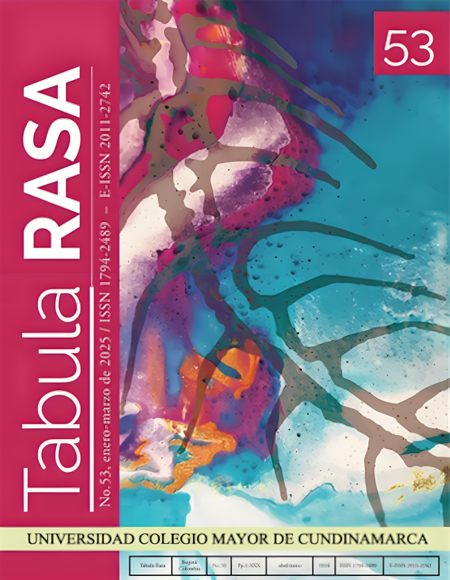Paradoxes of Democracy and De-democratization
Paradojas de la democracia y desdemocratización
Show authors biography
In this article, I sustain the philosophical thesis that a “crisis of democracy” is not a circumstantial phenomenon. Quite the opposite, de-democratizing tendencies are structural in capitalist democracies. The main reason for this is that de-democratization processes are inherent to broader dispossession processes aiming to privatize the decisions on the production and reproduction life, and to remove responsibility over those decisions. De-democratization is the tendency to the loss of decision power over one’s own destiny, both on the individual and collective level. Thus, the democratic paradox is not, as traditionally understood, between human rights and popular sovereignty. On the contrary, capitalist democracies themselves have a de-democratizing structure that neutralizes popular sovereignty to make it harder to effectively guarantee vulnerable people’s rights.
Article visits 285 | PDF visits 172
Downloads
- Arboleda, M. (2020). Planetary Mine: Territories of Extraction under Late Capitalism. Verso.
- Bertomeu, M. J. & Domènech, A. (2005). El republicanismo y la crisis del rawlsismo metodológico (Nota sobre método y sustancia normativa en el debate republicano). Isegoría, 33, 51-75. https://isegoria.revistas.csic.es/index.php/isegoria/article/view/418
- Brown, W. (2019). In the ruins of neoliberalism. The rise of antidemocratic politics in the West. Columbia University Press.
- Brown, W. (2006). American Nightmare. Neoliberalism, Neoconservatism, and DeDemocratization. Political Theory, 34(6), 690-714.
- Coulthard, G. S. (2009). Red Skin, White Masks. Rejecting the Colonial Politics of Recognition. University of Minnesota Press.
- Du Bois, W. E. B. (2015). The African Roots of War. The Atlantic Monthly, 115(5), 707-714. https://www.theatlantic.com/magazine/archive/1915/05/the-african-roots-ofwar/528897/
- Federici, S. (2004). Caliban and the Witch. Women, The Body and Primitive Accumulation. Autonomedia.
- Fraser, N. (2020). Los talleres ocultos del capital. Un mapa para la izquierda. Traducción de Juan Mari Madariaga y Cristina Piña Aldao. Traficantes de Sueños.
- Fraser, N. (2015). Legitimation Crisis? On the Political Contradictions of Financialized Capitalism. Critical Historical Studies, 2(2), 157-189.
- Harvey, D. (2004). The ‘‘new’’ imperialism: accumulation by dispossession. Socialist Register, 40, 64–87. https://socialistregister.com/index.php/srv/article/view/5811
- Lafont, C. (2019). Democracy without Shortcuts. Oxford University Press.
- Landemore, H. (2020). Open Democracy: Reinventing Popular Rule for the Twenty-First Century. Princeton University Press.
- Luxemburgo, R. (1975 [1913]). Die Akkumulation des Kapitals. Gesammelte Werke. (Tomo 5 pp. 5-411), Berlin/DDR.
- Marey, M. (2023a). Contra la banalización procedimentalista de la democracia. Bordes, 28, 203. https://publicaciones.unpaz.edu.ar/OJS/index.php/bordes/article/view/1491
- Marey, M. (2023b). Consenso, conflicto, dominación. Jacobin, 17/08/2023. https://jacobinlat.com/2023/08/consenso-conflicto-dominacion-tres-visiones-sobre-lademocraciaargentina/
- Marey, M. (2022a). La metodología blanca en filosofía política y la blancotopía: notas para leer a Charles Wade Mills. En Seminario «Democracia y resistencias en la temprana modernidad americana». (Ed.), Apuntes para una lectura teórico-política de la modernidad (pp. 213-235). Tinta Limón.
- Marey, M. (2022b). El liberalismo en crisis. Notas críticas sobre las libertades y las esclavitudes en Benjamin Constant. Isegoría, 66, e26. https://doi.org/10.3989/isegoria.2022.66.26
- Marey, M. & De Oto, A. (2024). Historic Injustices as Matters of the Present. Res Publica (2024). https://doi.org/10.1007/s11158-024-09657-z
- Marx, K. (1989 [1883]). Das Kapital. Kritik der politischen Ökonomie. Erster Band. Hamburg 1883 Text. Marx-Engels-Gesamtausgabe. (Vol. II.8. pp. 46-787). Dietz Verlag.
- McCormick, J. (2003). Machiavelli against Republicanism: On the Cambridge School’s “Guicciardinian Moments”. Political Theory, 31(5), 615-643. https://www.jstor.org/stable/3595689
- Meiksins Wood, E. (1995). Democracy Against Capitalism. Renewing Historical Materialism. Verso.
- Mills, C. W. (2005). La teoría ideal como ideología. En Seminario «Democracia y resistencias en la temprana modernidad americana», (Ed.), Apuntes para una lectura teórico-política de la modernidad (pp. 213-235). (Traducido por Macarena Marey). Tinta Limón
- Mouffe, C. (2000). The Democratic Paradox. Verso
- Nichols, R. (2015). Disaggregating primitive accumulation. Radical Philosophy, 194. https://www.radicalphilosophy.com/article/disaggregating-primitive-accumulation
- Quijano, A. (2001). Colonialidad del poder, eurocentrismo y América Latina. En E. Lander (Ed.). La colonialidad del saber. Eurocentrismo y ciencias sociales. Perspectivas latinoamericanas (pp. 201-246). Clacso.
- Quijano, A. (2000). Colonialidad del poder y clasificación social. Journal of World-System Reseach VI(2), 342-386.
- Restrepo, E. & Rojas, A. (2010). Inflexión decolonial: fuentes, conceptos y cuestionamientos. Editorial Universidad del Cauca.
- Roberts, W. (2020). What was primitive accumulation? Reconstructing the origin of a critical concept. European Journal of Political Theory, 19(4), 532-552
- Robinson, C. (1983). Black Marxism: The Making of the Black Radical Tradition. Zed Books.
- Smith, G. (2009). Democratic Innovations: Designing Institutions for Citizen Participation. Cambridge University Press.
- Valdez, I. (2023). Democracy and Empire. Labor, Nature, and the Reproduction of Capitalism. Cambridge University Press.
- Vergara, C. (2022). Systemic Corruption: Constitutional Ideas for an Anti-Oligarchic Republic. Princeton University Press.
- Wang, J. (2018). Carceral Capitalism. Semiotext(e).
- Whyte, J. (2022). The Market, The Philosopher, 110(2). https://www.thephilosopher1923.org/post/the-new-basics-market
- Whyte, J. (2019). The Morals of the Market: Human Rights and the Rise of Neoliberalism. Verso.








